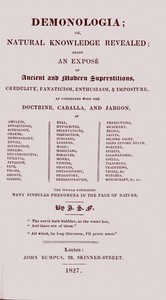| Title |
Demonologia : or, natural knowledge revealed; being an exposé of ancient and modern superstitions, credulity, fanaticism, enthusiasm, & imposture, as connected with the doctrine, caballa, and jargon, of amulets, apparitions, astrology, charms, demonology, devils, divination, dreams, deuteroscopia, effluvia, fatalism, fate, friars, ghosts, gipsies, hell, hypocrites, incantations, inquisition, jugglers, legends, magic, magicians, miracles, monks, nymphs, oracles, physiognomy, purgatory, predestination, predictions, quackery, relics, saints, second sight, signs before death, sorcery, spirits, salamanders, spells, talismans, traditions, trials, &c. witches, witchcraft, &c. &c. the whole unfolding many singular phenomena in the page of nature
|
| Summary |
"Demonologia: or, Natural Knowledge Revealed" by J. S. F. is a historical account written in the early 19th century. The text serves as an exposé of ancient and modern superstitions, credulity, and fanaticism, discussing a wide range of topics related to demonology, witchcraft, astrology, and various beliefs in the supernatural. The work aims to illuminate the absurdities of these beliefs and their implications on society and individual logic. The opening of the work sets the stage for a critical examination of humanity's enduring fascination with superstition, even as society has made strides towards enlightenment. J. S. F. reflects on the historical context, noting how past societies were heavily influenced by superstitions, with figures such as priests and magicians using such beliefs to manipulate the populace. The author critiques this credulity, asserting that many customs and beliefs stem from barbaric origins, and emphasizes the need for rational inquiry to challenge these outdated notions. The initial chapters delve into specific examples of superstitious practices, highlighting their persistence even in an age of reason and the absurdity of such beliefs in the light of contemporary understanding. (This is an automatically generated summary.)
|

